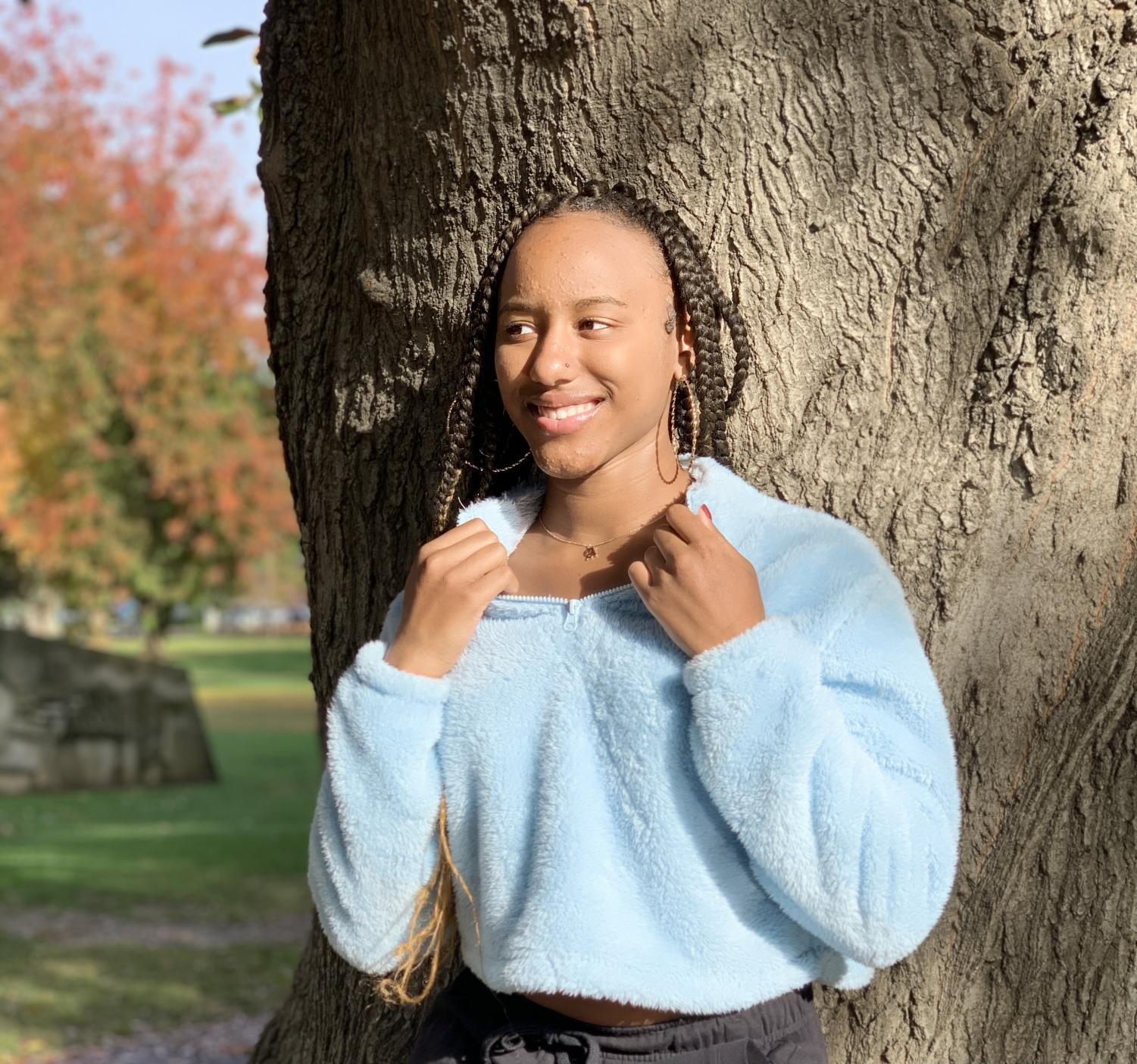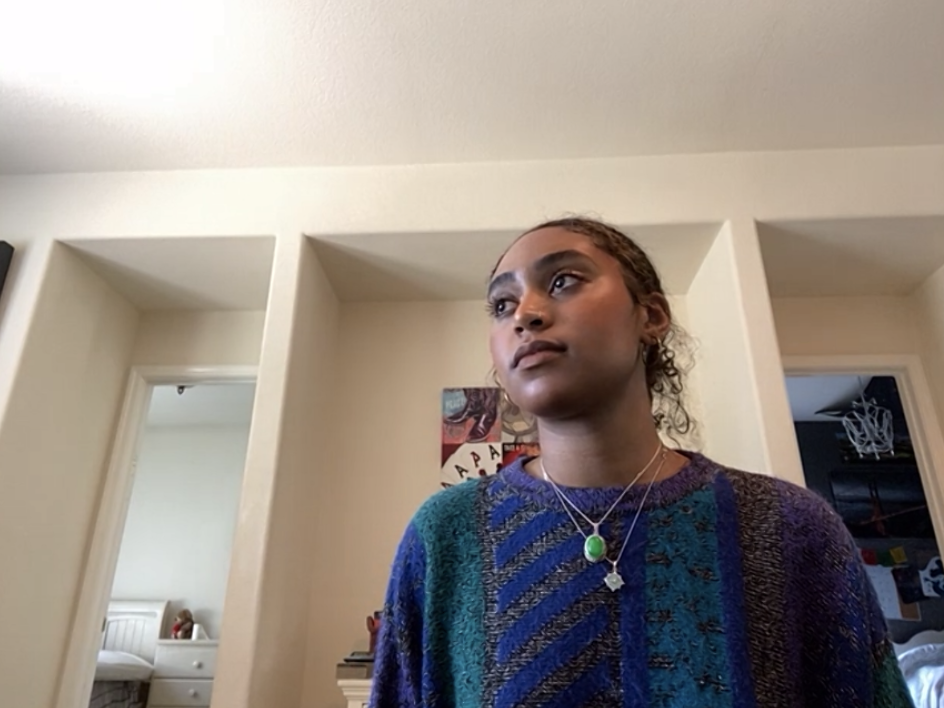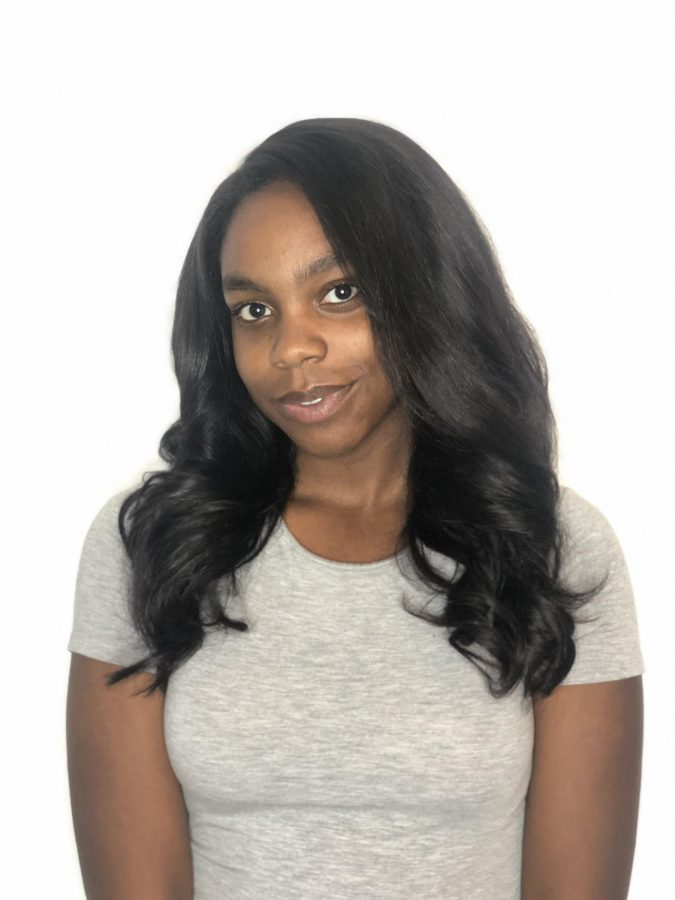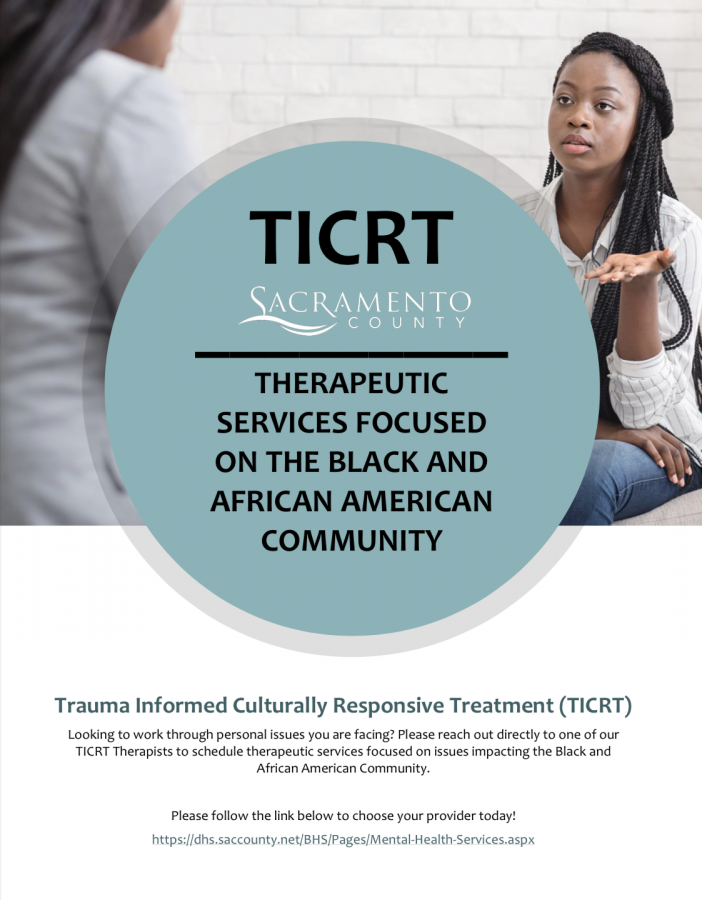Your donation will support the student journalists of Sacramento State University. Your contribution will allow us to purchase equipment and cover our annual website hosting costs.

 |  |
San Francisco State University student Toshiar Green addresses a crowd at a Black Lives Matter rally at the California State Capitol steps in Sacramento, California on Friday, March 23, 2018. Sac State students reveal how police brutality and the massive media coverage reporting it has impacted and affected their mental health. Photo in background taken by Emily Rabasto. Graphic created in Canva.
‘We’re really not valued’
June 7, 2021
Ever since May 25, 2020, when George Floyd was murdered by now-convicted police officer Derek Chauvin, the conversation about police interactions with Black people has been prevalent in the U.S., impacting some Black Americans’ mental health due to the constant coverage of police brutality.
Candice Simpson, a practicum student counselor for Authentic Counseling Associates, said some communities do not understand the impacts of police brutality on the Black community even though they see it portrayed in the media.
“It can make people feel like it is happening all over,” Simpson said. “The African American experience, we know that that happens. For us, it’s just shining a light on stuff that has already been going on.”
Simpson said universities and schools can aid the problem of people being affected by police brutality psychologically. She cited Roseville high schools as a positive example of mental health resources in schools, as each high school campus has a wellness center on site to provide mental health resources, saying it is important to have “someone that knows the experience a person is coming from.”
“[Police brutality] is becoming a regular or almost weekly thing, and I just get so overwhelmed that I’ll just have to completely remove myself from watching the news or being on social media.”
- Karris Brooks
Simpson said having a competent counselor is key when a person is looking to discuss cultural topics and problems in therapy.
“If they say ‘I have Black and Latino friends,’ that doesn’t constitute as being competent in the culture,” Simpson said. “Finding counselors who actually have time invested within communities to understand the nuances of what Black culture is and the responses toward violence in the community is going to be best.”
Simpson also said an outlet is important to helping people cope with what they are experiencing and seeing in the media.
“Give them an outlet to be able to express themselves, I think that’s number one,” Simpson said. “Whether it’s schools holding town hall sessions or city town halls, just assigning counselors so they can just get it out.”
Story continues below the chart.
Her approach to counseling someone that has dealt with police brutality would be to see what their coping mechanisms are.
“If this person is coming to me and they need to vent or an outlet because they find that the stress is getting in the way of their daily life, then I want to find out their coping mechanisms, how they deal with the stress,” Simpson said.
The State Hornet spoke with Black Sacramento State students about how police brutality and the media coverage reporting it has impacted their mental health and compiled mental health services available for students at Sac State and in Sacramento.
Ramifications of police brutality on Sac State students’ mental health
Story continues below the image.

Aladria Brown, a theatre major, said the coverage surrounding police brutality has desensitized her to Black death. Brown said she prefers to delete social media when the media coverage of police brutality becomes too much to handle. Photo courtesy of Brown.
Aladria Brown, Associated Students, Inc. Director of Arts and Letters-elect, said police brutality affects her mental health by making her feel like excessive force by police can happen to her, her family or anyone with her skin complexion.
“It scares you and makes you think of death because of all the continued videos of people dying from police brutality,” Brown, a 19-year-old theatre major, said.
Brown said seeing the news broadcasting the deaths for millions of viewers has desensitized her to the incidents.
“It really desensitizes you to Black death,” Brown said. “It’s like seeing a lynching but on video.”
When footage of police brutality is being circulated on social media, Brown said she deletes social media because it can be too much for her to handle.
Brown said she does not utilize Sac State’s Student Health and Counseling Services to discuss the impacts of these events on her mental health but uses behavioral therapist Alondra Thompson’s services in Sacramento. Thompson provides her own services specializing in anxiety, depression and trauma for adolescents, individuals, couples and families. To make an appointment, call (916) 470-8260 or contact her through her website.
“Going to therapy has improved my mental health greatly,” Brown said. “It reminds me to do the little things in my life.”
Alton Williams, a Sac State alumnus, an adjunct professor in the criminal justice department and program coordinator for Project Rebound, said prior police interactions negatively affected his mind.
“There’s been a number of different occasions where I had law enforcement pull their guns out on me,” Williams said. ''Quite frankly just harass me, for relatively minor things like not having a license plate light, having an air freshener, same as what happened with Daunte Wright...I’ve been pulled over for the exact same thing.”
Daunte Wright, a 20-year-old Black man, was fatally shot by police in Minnesota on April 11 following a traffic stop. He called his mother during the traffic stop saying that he was being pulled over for having an air freshener hanging from his rearview mirror and blocking his line of sight while driving. The police department later said the officer intended to use her taser but accidentally used her gun instead.
"There are times where I think that all of this could’ve been solved if I had a different skin color, so you slowly start to hate your own skin."
- Aissatou Fall
Williams said these incidents affected him “psychologically,” and he felt that his race became a “license to harass or license to pull over.” He said traffic stops by police are different for people of color, and their accomplishments or credentials do not matter in the moment when the police see them as a Black man.
“My race definitely played a factor," Williams said. "It probably wasn’t the sole factor, but it was the determining factor. Take someone that’s white, for example, and place them in the same situation I was in. I think the outcome would be different on most occasions.”
Williams discussed some coping strategies for young Black men and anyone else who has dealt with police brutality.
“I feel like, in many instances, it’s a war, not literal war, but a war, and you have to find your front,” he said. “Your front may be in the classroom teaching, your front may be protesting, your front may be becoming a senator, becoming a legislator, and trying to impact change that way.”
Williams believes the way Black people are portrayed within the media could give police the wrong impression and cause them to be prejudiced based on stereotypes, saying the media “reinforces those stereotypes that continue to drive these negative images, negative stereotypes of people of color.”
“I believe with some officers or many officers, when they see or think Black male, the first thing they think of is that rap video or that hood movie. We have to realize that this is their frame of reference,” Williams said.
Karris Brooks, a 21-year-old nutrition major at Sac State, said before she learned about how America treats and views Black people, she used to view police officers as people who save others from danger.
Brooks said her viewpoint has changed following the repeated incidents of police brutality in the U.S.
“Now when I see a police officer, immediately I feel unsafe or worried that something may happen,” Brooks said. “[Police brutality] does give me stress knowing that my brother or sister could end up like someone on the news.”
Story continues below the image.

Karris Brooks, a nutrition major at Sac State, discusses how police brutality affects her mental health and how she copes with its ramifications on April 23, 2021. Brooks said when news coverage of police brutality starts to affect her mental health, she makes sure to avoid social media for a couple of days. Photo taken via Zoom.
Brooks said the mass media coverage surrounding police brutality has made her numb to seeing Black people being killed by police.
“[Police brutality] is becoming a regular or almost weekly thing, and I just get so overwhelmed that I’ll just have to completely remove myself from watching the news or being on social media,” Brooks said.
Brooks said police brutality combined with the large media presence made her feel more aware about how the Black community is perceived in America.
“We’re really not valued, the system is not made for us at all,” Brooks said. “These events that keep happening are no longer surprising to me. I see that we are not a priority, and Black lives do not matter to the police.”
When police brutality media coverage starts to affect Brooks’ mental health, she said she stays away from watching the news and avoids social media for a couple of days.
Although she does not use Student Health and Counseling Services offered at Sac State, Brooks said she has been trying to find a therapist using the Therapy for Black Girls website, though many therapists are booked and not accepting new clients.
For other Black students struggling with police brutality and the coverage surrounding it, Brooks suggested it is helpful to find like-minded people to open up about struggles and challenges.
“Remember that despite all of our hardships, we are resilient and beautiful,” Brooks said.
Aleyah Glasper, a 22-year-old anthropology major and archeology minor, said that police brutality has negatively affected her mental health.
“Police brutality has not only changed the way I think, my overall mental being, but how I navigate through life,” Glasper said. “Seeing and experiencing police brutality has caused many emotions and has completely set on depression.”
Glasper said that she talks through her pain and emotions with loved ones to cope with police brutality and the major news outlets broadcasting it.
Story continues below the image.

Aleyah Glasper, an anthropology major and archeology minor, said police brutality has affected her mental health and changed the way she navigates through life. Glasper said she speaks with loved ones about her emotions to cope with the emotional pain it evokes. Photo courtesy of Glasper.
Fall said she talks with her family and avoids social media when she feels overwhelmed watching the news coverage on police brutality.
“I talk about it with my loved ones, classmates and continue to support my people,” Glasper said.
Aissatou Fall, a 19-year-old civil engineering major, said police brutality and the media coverage surrounding it can be stressful and draining because she worries that the police will see her skin color as a target.
“It almost feels like you can never be innocent as long as you have a darker complexion,” Fall said.
Fall recalls Breonna Taylor being killed by police in her apartment and said she thinks about how that could have been her in the same situation.
Taylor, a 26-year-old Black emergency medical technician, was shot and killed by Louisville police officers on March 13, 2020, during a botched raid in her apartment.
“Every time I read about innocent people that were killed by police officers, I think that literally could’ve been me,” Fall said. “There is not a day that goes by where I don’t think to myself that that literally could’ve been me sleeping in my apartment.”
Fall said she loves how there is a lot of media coverage on police brutality because it spreads awareness, but on the other hand, she said hearing about police brutality messes up her entire day and makes her feel overwhelmed.
Fall said police brutality coupled with the continued media coverage results in her not being able to trust the police and starting to hate herself because she believes things would be different if she had a different skin color.
“There are times where I think that all of this could’ve been solved if I had a different skin color, so you slowly start to hate your own skin,” Fall said. “It takes a strong mentality to acknowledge that being Black isn’t the problem, but the police is the problem.”
Fall said she has not sought out help from any mental health services because she is not sure how it would help her and does not know where to receive help.
Tyrone Ralph, a Sac State alum and member of the university’s Center On Race, Immigration and Social Justice, said he feels the police tend to treat people of color differently, which makes their human rights “blurry.”
“We are treated differently because we exist in the form of a de facto second class status,” Ralph said. “This system of first-class status and second-class status has been so ingrained in a certain kind of way...They are false social constructs. There's only one race of people genetically speaking, there's only one human race.”
Ralph believes people have to look at the history of the sheriff and police in order to understand their behavior towards people of color.
“When we look at the history of the sheriff and the police in America, they grow directly out of the slave patrol in the mid-1800s and late 1800s historically speaking,” Ralph said. “What has always escaped us is Blacks by design are a second class status group of people that do not have, legally speaking, the same protections under the law as those that are categorized as white.”
Mental health services available at Sac State
Ronald Lutz, director of Student Health and Counseling Services at Sac State, said Sac State does not have a specific service to address police brutality but that SHCS is available to work with students who have been mistreated by police and any other traumatic issue.
“I have full confidence that any of my staff could help students who have been victims of police brutality in a sensitive, productive and caring manner,” Lutz said. “My staff are all licensed mental health professionals who participate in ongoing continuing education each year to keep current with contemporary cultural and mental health issues they face in practice.”
In terms of reporting police brutality or any complaint, students may report these issues to any on-duty supervisor or by using the complaint form, Sac State Police Chief Mark Iwasa said.
He said Sac State's Police Department also accepts email complaints and phone calls to the Office of the Chief at 916-278-7321.
If the allegation is excessive force, Iwasa said the case will be assigned as an Internal Affairs investigation.
Incidents can also be reported to the Office for Equal Opportunity or the President’s office, Iwasa said.
Lutz also said in terms of reporting police brutality, contacting the Office of Vice President for Student Affairs is a good place to start.
Currently enrolled students can make an appointment with SHCS here.
Where to find help in Sacramento
Story continues below the image.

Therapeutic Services in Sacramento offers trauma informed, culturally responsive treatment for the Black and African American community. The service is run through Sacramento County’s Department of Health Services. Photo courtesy of Sacramento County.
The Sacramento County District Attorney’s Office provides victim services through its Victim Witness Assistance Program. The office offers services to people who have been victims of violent crimes, as well as provides crisis intervention, emergency services, funeral and burial services and supportive services.
In addition to those services, there is a homicide support group that meets monthly for families who have suffered the loss of a loved one through homicide.
Sacramento community members who need ongoing counseling may be referred to other community services by the District Attorney’s office depending on the victim, location and needs. Some community agencies include Therapeutic Services focused on the Black and African American Community and Wellspace Health Services.
Therapeutic Services focused on the Black and African American Community have three providers: Rabiia Ali, Arrickia McDaniel, Sonya Howell and Patrice Tevis. These providers specialize in treating African American clients who struggle with trauma, cultural issues, criminality, depression, anxiety and more. Reach out directly to a provider to schedule services. To learn more visit here.
Wellspace Health’s behavioral health and prevention services offer a broad spectrum of services to address patients’ needs. They offer individual counseling for children, adults, families, group counseling, mental health evaluations and more. The psychiatric staff specializes in training to help people deal with changes, challenges and crises in life.
To make an appointment call (916) 737-5555. Wellspace Health’s services are available to those who are on Medi-Cal, as well as those who are uninsured or underinsured. To learn more visit here.
To report police brutality or any other improper conduct by a Sacramento Police Department employee, people may fill out a personnel complaint form. In addition to the online complaint form, people may also call Internal Affairs at (916) 808-2290, send an email to Internal Affairs at [email protected] or may contact the Office of Public Safety Accountability.
Your donation will support the student journalists of Sacramento State University. Your contribution will allow us to purchase equipment and cover our annual website hosting costs.

 |  |